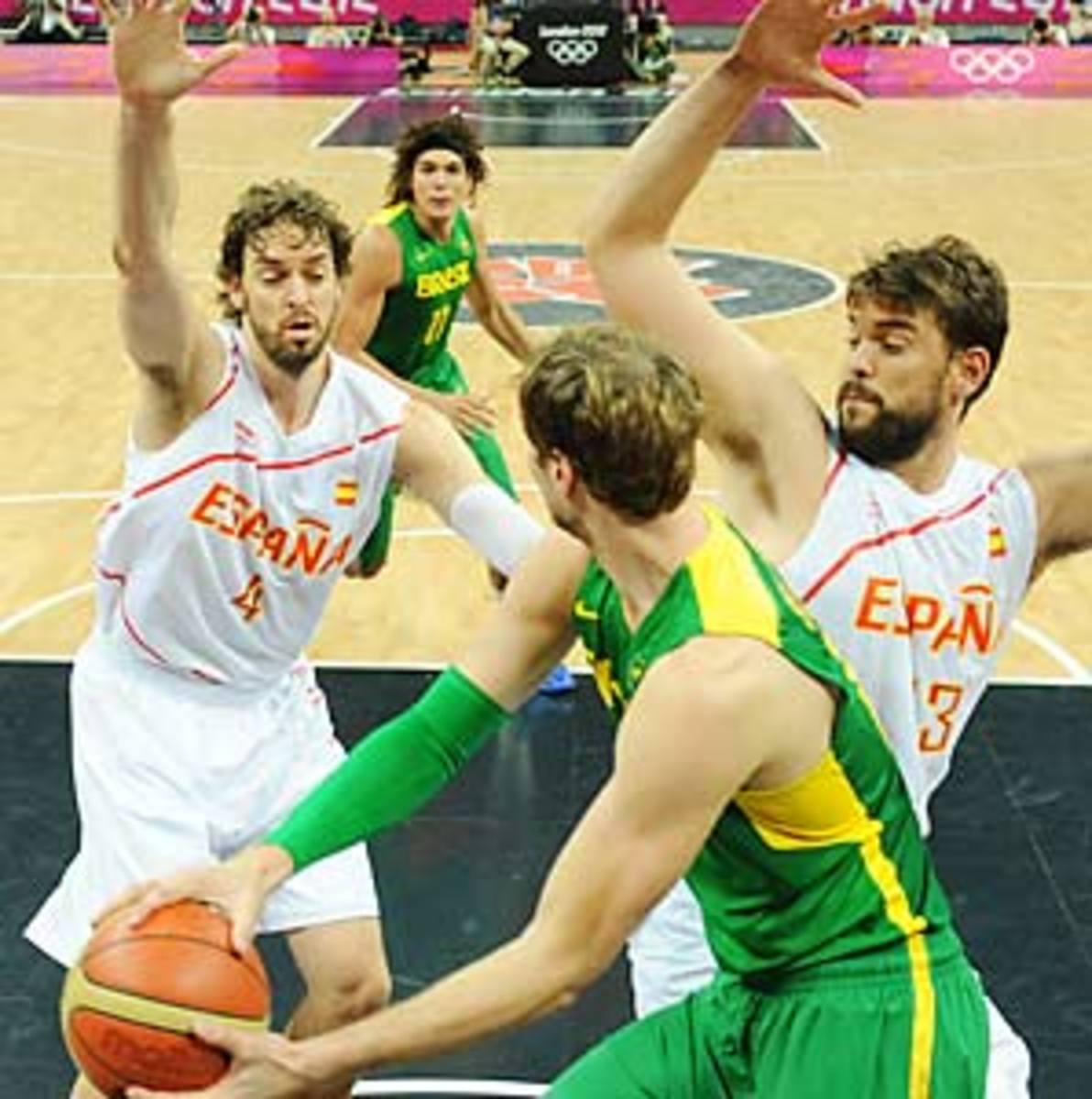
Spain banged-up but still a threat to U.S. in decisive Olympic final
And yet, in spite of their overwhelming talent and ever-storming threat to destroy any opponent within the span of one fast-breaking minute or two, a victory is not inevitable for the Americans. Their opponent, Spain, appears to be approaching the final with an unspoken sense that it is meant to win a game like this.
"It just shows a lot of character, a lot of great spirit,'' said Pau Gasol of Spain's ascension to the final. "We know how to suffer.''
The Spaniards have been exceedingly unimpressive throughout the Olympic tournament. Their upset by Russia led to accusations that they lost their subsequent preliminary game to Brazil in order to position themselves for this final against these Americans. In the medal rounds France and Russia were in command before surrendering to Spanish comebacks in the second halves.
Spain has been neither peaking nor healthy. Marc Gasol has been troubled by injuries to his shoulder and knee. Juan-Carlos Navarro has lost his explosiveness to plantar fasciitis. Rudy Fernandez had back surgery in March, Ricky Rubio is out with knee surgery, and Serge Ibaka has been buried at the end of the playing rotation. Spain appeared to be more dangerous in 2008, when it lost the Olympic final to the U.S. by 118-107 after pulling within four points in the final three minutes.
"It has been a very complicated road, and we've had a lot of hurdles on the road this time,'' said Pau Gasol. "In 2008 our team was probably better in terms of physical condition, and our road was slightly easier to the final. Our level of play was probably a little higher than it is right now. We have had to overcome a lot of adversity. There is a lot of merit in what we've achieved.''
Pau Gasol and Navarro, the team captain, are both 32, and they have been playing for Spain since they were juniors in their teens. The danger for the U.S. will emerge if Spain is able to manage the pace and stay within range into the second half, which is a moral victory that has been achieved by opponents in the last four U.S. games. Neither Lithuania nor Australia nor Argentina (which lost twice to the U.S. in the last week) had the experience, talent and confidence to finish the job. Spain, alone in the 11-team Olympic field of U.S. challengers, may be able to generate the necessary confidence, based on the understanding that the Gasols, Jose Calderon, Fernandez and its other excellent international players have made the investment in teamwork over the years that has earned them the chance to win.
"We always unite together,'' said Gasol. "We unite as a team in tough moments. We never give up.''
And yet even the most impressive Spanish performance may not be enough. The U.S. has benefited from its own form of cameraderie, based on friendships within the team that date back to AAU tournaments and summer camps in high school. The U.S. opened training camp last month in Las Vegas without perimeter stars like Derrick Rose and Dwyane Wade, but the team has not suffered in their absences. Krzyzewski responded to injuries among big men Dwight Howard, LaMarcus Aldridge, Blake Griffin and others by turning the weakness of size into a strength: The scoring and athleticism of LeBron James, Kevin Durant and Carmelo Anthony -- all 6-8 or taller -- have created insurmountable problems for opposing front lines.
The most interesting matchup of the final will be the size of Spain upfront (the Gasol brothers are both 7-footers) against the athleticism of the American forwards. Krzyzewski said he has no plans to give extra minutes to 7-1 Tyson Chandler and 6-10 Kevin Love; nor does he expect Spain to go small. "They'll have two of their bigs in, whether it be the Gasols, (6-10 Serge) Ibaka or (6-9 Felipe) Reyes,'' said Krzyzewski. "We just have to make sure what we do is better with what we have than what they do with what they have. And both of us have good things.''
If the game is tight into the final minutes, then Spain will surely have a difficult time dealing with James, who in these Olympics has been building on the gains he earned during his run to the NBA championship in June. He has been the dominant player of the tournament at both ends of the court, whether guarding out to the three-point line or under the basket; whether organizing his team as its point guard or attacking the basket as the world's most dangerous finisher.
"I'm so amazed at how smart LeBron is,'' said Krzyzewski. "His retention and his knowledge of the game is superb. Obviously our point guards are like that, but LeBron is the leader. Everyone talks about his physical prowess, but he's got a lot of other things working.''
Will James allow Spain to fulfill itself at the expense of the U.S.? Not likely. But it will be intriguing to see how far teamwork and togetherness can carry the Gasols and their talented countrymen.




